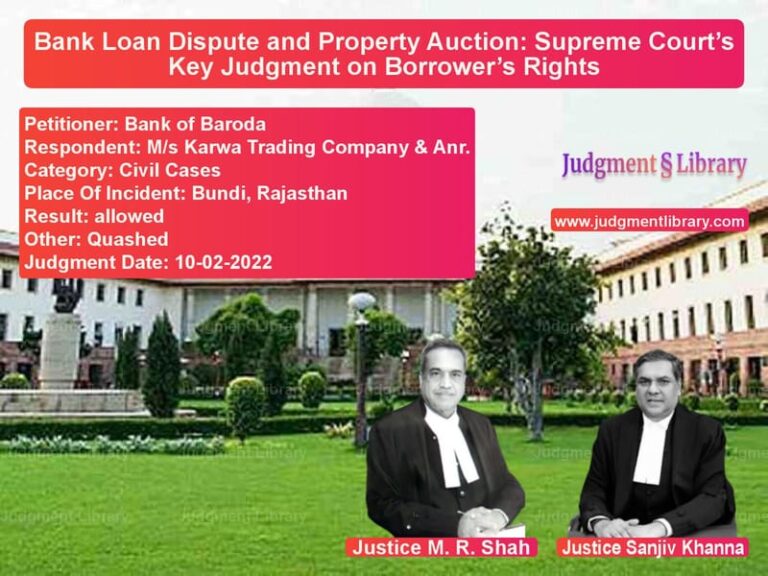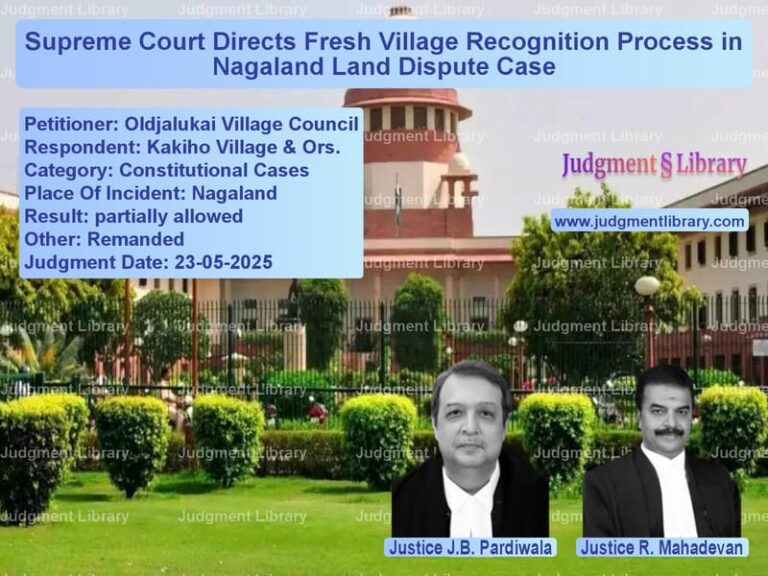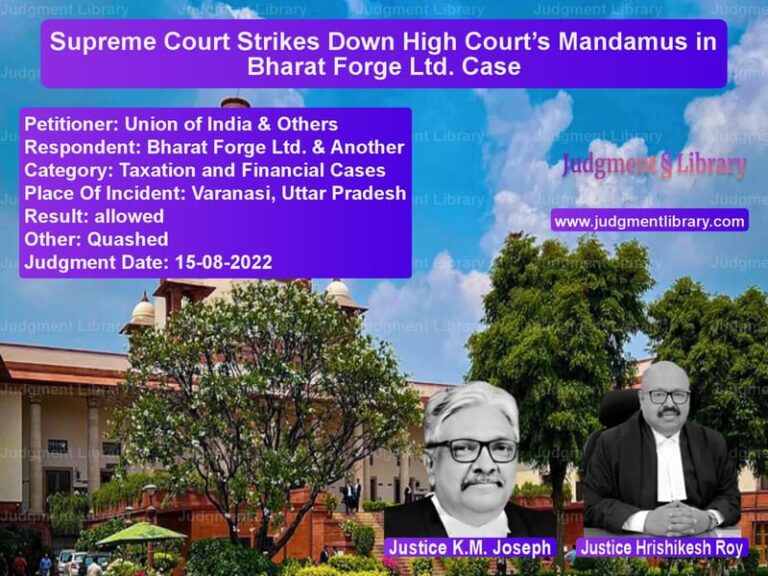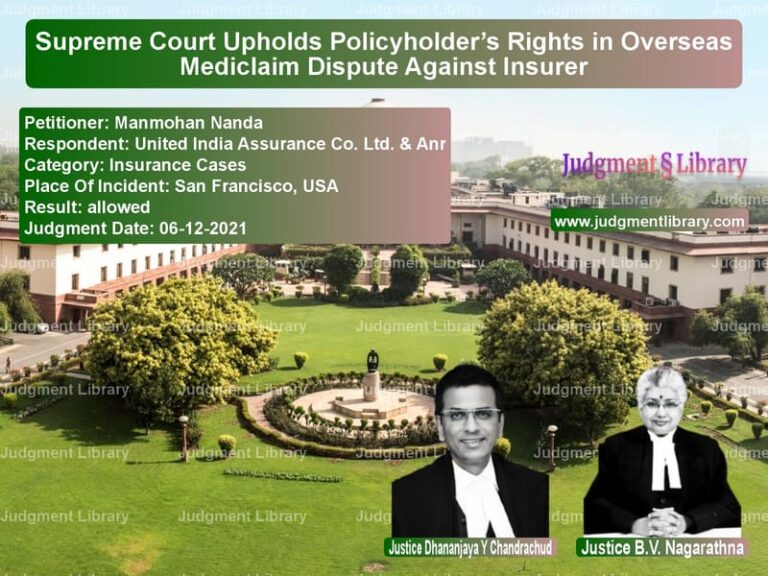Homebuyer’s Compensation Dispute: Supreme Court Ruling in K.L. Suneja vs. Dr. Manjeet Kaur Monga Case
The Supreme Court of India recently delivered a judgment in the case of K.L. Suneja & Anr. vs. Dr. (Mrs.) Manjeet Kaur Monga & Anr., a dispute concerning a real estate transaction. The case involved a long-standing legal battle between a homebuyer and a builder over delayed possession, cancellation of allotment, and compensation claims.
Background of the Case
The dispute dates back to 1989, when Smt. Gursharan Kaur applied for a flat in the ‘Siddharth Shila Apartments’ housing scheme in Ghaziabad, Uttar Pradesh. She made three installment payments towards the flat but passed away before its completion. Her daughter-in-law, Dr. Manjeet Kaur Monga, continued the payments and was issued an allotment letter in 1992.
Over the years, Dr. Monga made multiple installment payments, but the builder failed to complete the construction. In 2005, after prolonged delays, the developer unilaterally canceled the allotment and issued a refund of ₹4,53,750/-, the total amount deposited by the complainant. However, Dr. Monga refused to accept the refund, arguing that she was willing to pay the remaining amount and wanted possession of the flat.
Subsequently, she filed a complaint under Section 36 of the Monopolies and Restrictive Trade Practices Act, 1969 (MRTP Act), alleging unfair trade practices by the developer and seeking either possession of the flat or compensation.
Arguments by the Petitioner (Builder/Developer)
- The builder argued that the homebuyer had defaulted on the payment schedule, justifying the cancellation of the allotment.
- They contended that the delay in construction was due to litigation with the Ghaziabad Development Authority, which was beyond their control.
- The developer had already refunded the deposited amount through a pay order dated April 30, 2005, and was not liable for any further claims.
- They asserted that since the refund had been issued, no further interest should be payable on the amount.
Arguments by the Respondent (Homebuyer)
- Dr. Monga maintained that she had been regularly making payments and that the developer’s failure to complete the construction was a breach of contract.
- She claimed that she had returned the refund pay order and had demanded either possession of the flat or an alternative unit of equal value.
- The homebuyer accused the builder of engaging in unfair trade practices by delaying possession, misrepresenting the timeline, and later canceling the allotment.
- She sought compensation of ₹25,00,000 for the loss suffered due to the builder’s actions.
Lower Tribunal Findings
The Monopolies and Restrictive Trade Practices Commission (MRTPC) found that the builder had engaged in unfair trade practices by failing to deliver possession on time and misrepresenting the progress of construction. However, it ruled that it could not grant specific performance (possession of the flat) but awarded compensation.
When the case was transferred to the Competition Appellate Tribunal (COMPAT) after the repeal of the MRTP Act, the tribunal upheld the builder’s liability for compensation. It directed the developer to pay compound interest at 15% per annum on the deposited amount from the date of payment till April 30, 2005, when the allotment was canceled.
Supreme Court’s Observations
- “The builder falsely represented the project’s completion timeline but failed to deliver the flat within a reasonable period.”
- “The homebuyer had deposited a substantial amount in good faith, and the cancellation of the allotment was unjustified.”
- “The refund issued by the builder was not accepted by the complainant, and litigation continued for years.”
- “The developer had the advantage of reselling the flat at a much higher price while holding the complainant’s money.”
- “The tribunal rightly awarded compensation in the form of interest; however, no additional compensation is warranted beyond the period already determined.”
Final Judgment
- The Supreme Court partially allowed the appeal of the developer, ruling that no additional compensation beyond the interest granted up to April 30, 2005, was payable.
- The court held that the refund amount was deducted from the builder’s account and was not in their possession after 2005.
- The builder was directed to pay compound interest at 15% per annum on the ₹4,53,750 deposit, calculated from the date of deposit until April 30, 2005.
- The appeal by the complainant (homebuyer) for further compensation was dismissed.
Legal Precedents Considered
- Ghaziabad Development Authority vs. Ved Prakash Agarwal (2008): Established that consumer protection bodies cannot grant specific performance but can award compensation.
- Gurpreet Singh vs. Union of India (2006): Addressed the applicability of interest payments in execution of monetary decrees.
- Citibank N.A. vs. Hiten P. Dalal (2016): Discussed principles of restitution and the obligations of banks in handling financial instruments.
Implications of the Judgment
- The ruling reinforces the principle that developers cannot indefinitely delay projects and then unilaterally cancel allotments.
- It establishes that buyers are entitled to interest on their payments in cases of project delays and cancellation.
- The judgment clarifies that once a refund is issued, additional compensation cannot be sought unless the funds remained with the developer.
- It highlights the need for stronger enforcement of real estate regulations to protect homebuyers from unfair practices.
Conclusion
The Supreme Court’s decision in this case brings clarity to homebuyers’ rights when faced with delayed possession and unfair cancellations. While the builder was held liable for interest on the deposited amount, the court also recognized the limitations of seeking compensation beyond a certain period. The ruling underscores the importance of transparency in real estate transactions and serves as a warning to developers about the consequences of misleading homebuyers.
Petitioner Name: K.L. Suneja & Anr..Respondent Name: Dr. (Mrs.) Manjeet Kaur Monga (D) Through Her LR & Anr..Judgment By: Justice M.R. Shah, Justice S. Ravindra Bhat.Place Of Incident: Ghaziabad, Uttar Pradesh.Judgment Date: 31-01-2023.
Don’t miss out on the full details! Download the complete judgment in PDF format below and gain valuable insights instantly!
Download Judgment: k.l.-suneja-&-anr.-vs-dr.-(mrs.)-manjeet-k-supreme-court-of-india-judgment-dated-31-01-2023.pdf
Directly Download Judgment: Directly download this Judgment
See all petitions in Damages and Compensation
See all petitions in Contract Disputes
See all petitions in Judgment by Mukeshkumar Rasikbhai Shah
See all petitions in Judgment by S Ravindra Bhat
See all petitions in partially allowed
See all petitions in Modified
See all petitions in supreme court of India judgments January 2023
See all petitions in 2023 judgments
See all posts in Civil Cases Category
See all allowed petitions in Civil Cases Category
See all Dismissed petitions in Civil Cases Category
See all partially allowed petitions in Civil Cases Category







